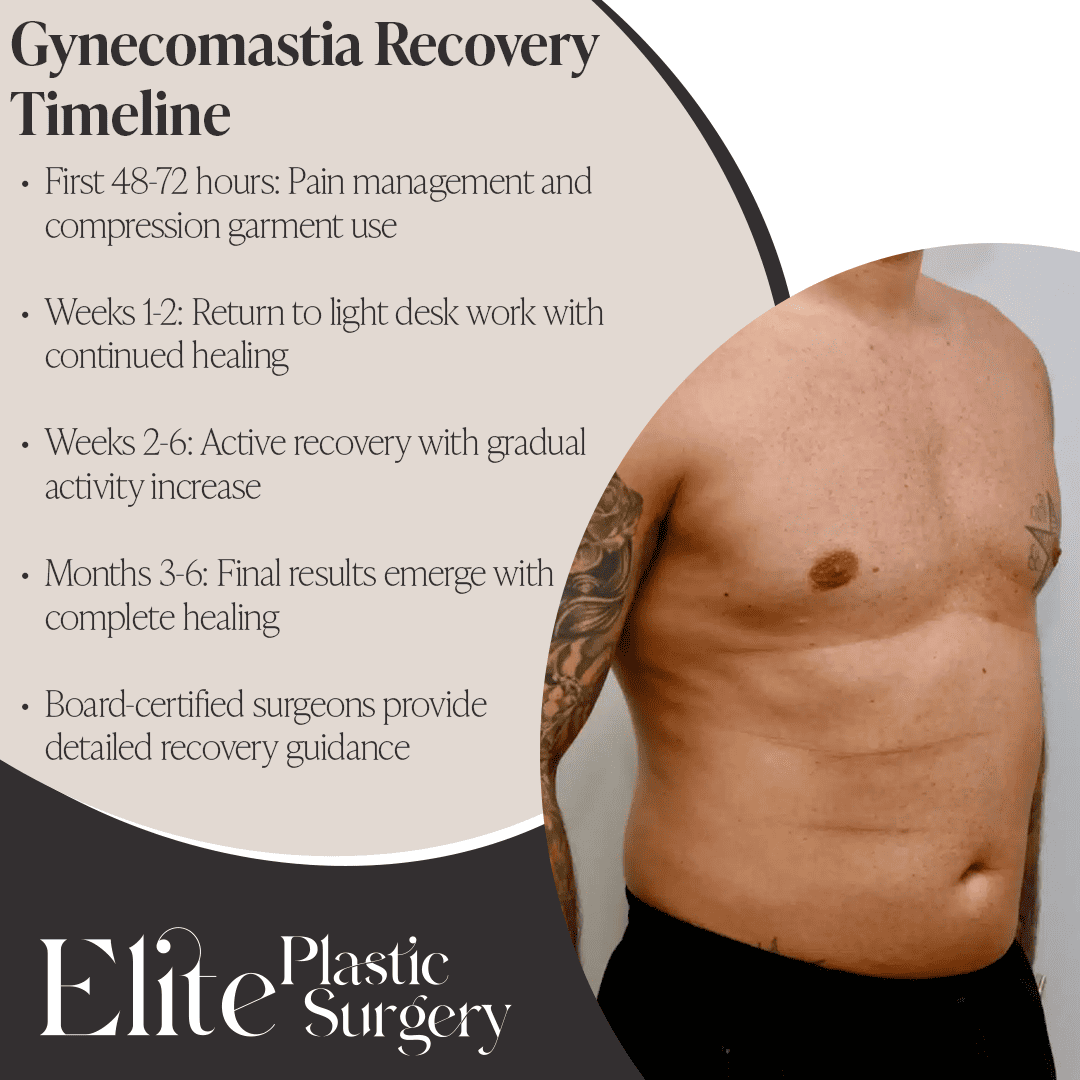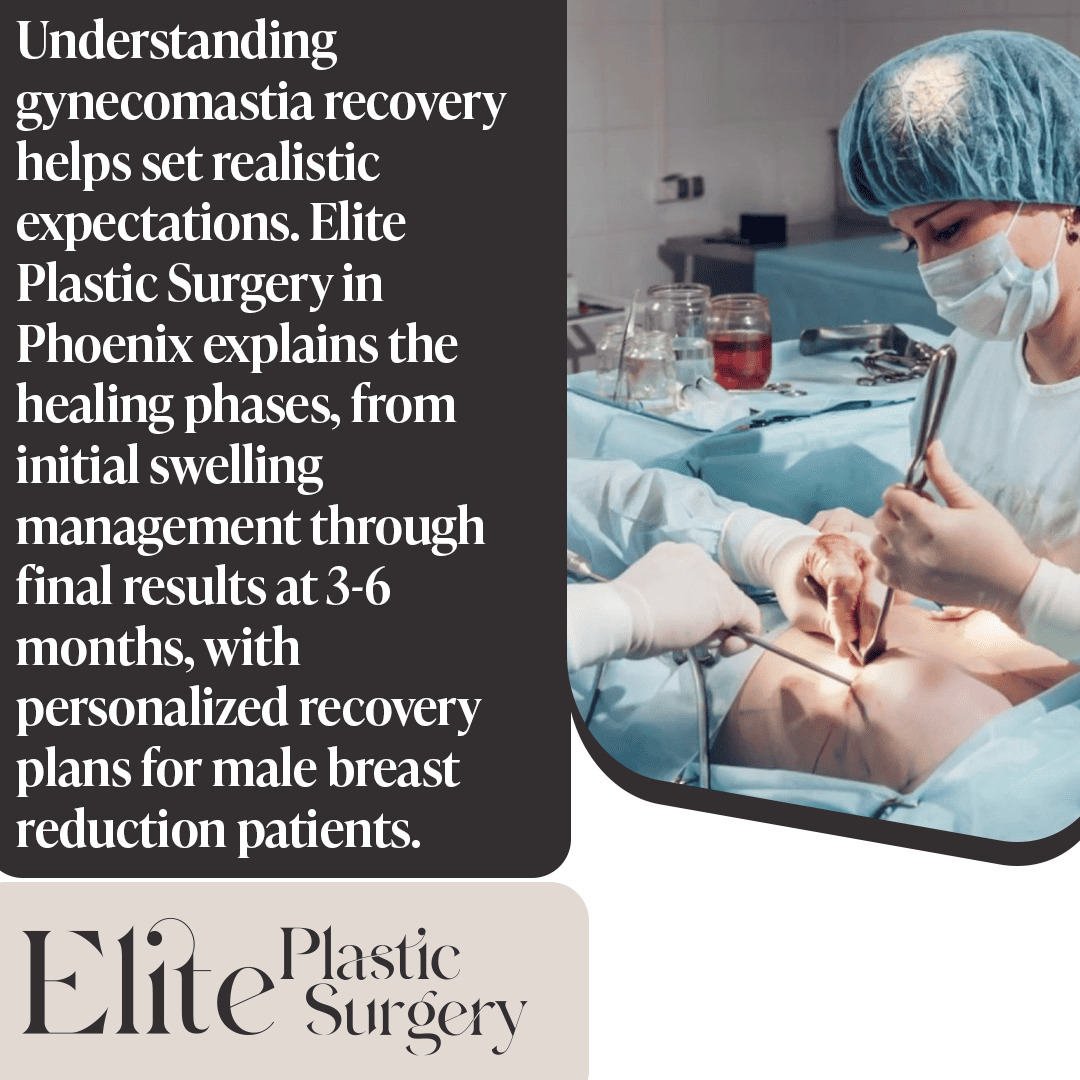Healing After Male Breast Reduction: Elite Plastic Surgery Explains What To Expect
Phoenix, United States - October 16, 2025 / Elite Plastic Surgery (Phoenix) /
Phoenix, AZ – Recovering from gynecomastia surgery can be as important as selecting the right surgeon. Male breast reduction (also called gynecomastia removal) involves the surgical treatment of excess glandular tissue and/or fat in the male chest to correct enlarged breasts. What to expect during recovery will depend on the cause of gynecomastia, whether liposuction alone or a combination of excision and liposuction is used, and individual healing factors. Elite Plastic Surgery, Phoenix, AZ, aims to guide patients through each stage of healing so they understand the process, reduce complications, and achieve natural‑looking results.
How Long Does Gynecomastia Surgery Take to Heal?
Healing after gynecomastia treatment generally proceeds in stages. While full recovery may take 3 to 6 months, many patients see major improvements well before that if they follow post‑operative instructions.
Surgical Technique & Its Impact on Recovery
Liposuction only: If excess fat is the dominant issue (rather than glandular tissue), liposuction‑only gynecomastia removal tends to offer a faster recovery. Swelling and discomfort are less, and many patients return to desk work within a week.
Excision (glandular tissue removal): When glandular tissue must be excised, recovery includes higher initial swelling, more bruising, and longer healing of deeper tissues. Return to work may be 1‑2 weeks, depending on job type.
Combined liposuction + excision: This gives the most comprehensive contouring but tends to require the longest recovery period among the options. Full chest contour tends to settle in several weeks to months following surgery.
Recovery Timeline Overview
Phase | Timeframe | What Patients Can Expect | Key Milestones |
Immediate / First 48‑72 Hours | Days 0‑3 | Pain, chest tightness, swelling peaks; compression garments in place; limited arm movement; rest with upper body elevated | Pain management starts; first follow‑up; the garment helps reduce swelling. |
Early Healing | Days 4‑14 (Weeks 1‑2) | Bruising visible, swelling begins to decrease; many patients return to light, non‑strenuous desk work; avoid heavy lifting and chest strain | Suture removal (if any); steady decrease in discomfort. |
Active Recovery | Weeks 2‑6 | More normal daily activities; light cardio possible; compression garment use continues; upper body exercise remains restricted until cleared. | Swelling reduces more; the beginning of chest contour visibility. |
Long‑Term Healing | Months 3‑6+ | Final results begin to appear; scars start fading; full return to exercise and strenuous activity when cleared; chest feels firmer and settled. | Contours stabilize; scar maturation continues through 6‑12 months. |
What Should Patients Avoid During Recovery
To support healing and mitigate risks after gynecomastia surgery:
Avoid heavy lifting, overhead arm motion, or pushing/pulling for at least 3‑4 weeks.
Do not resume chest‑targeted workouts until surgeon approval, usually around 4‑6 weeks.
Avoid sun exposure on incisions; protect scars.
Do not smoke or drink alcohol during the early phases of healing; maintain hydration and a protein‑rich diet.
Causes of Gynecomastia and Why Treatment Matters
Understanding the cause of gynecomastia helps set realistic expectations for recovery. Causes may include:
Hormonal imbalances (e.g., excess estrogen or reduced androgen)
Certain medications or substances
Age‑related hormone changes
Obesity (fat‑dominant breast tissue, sometimes called pseudogynecomastia)
Effective gynecomastia treatment (from hormone evaluation, medical options if applicable, through to surgical removal) yields both physical and psychological benefits. Knowing what causes gynecomastia in a particular case helps the surgeon plan the surgery and advise on how recovery will proceed.
Why Elite Plastic Surgery Is a Trusted Choice for Gynecomastia Removal
Elite Plastic Surgery in Phoenix, AZ, has board‑certified plastic surgeons who specialize in male breast reduction using advanced techniques designed to minimize tissue trauma and support efficient healing. Patients are provided with detailed pre‑op guidance and a personalized recovery plan, including the use of compression garments, follow‑up care, and realistic timelines for work return, activity resumption, scar fading, and final results.
Recover Faster With Expert Gynecomastia Treatment in Phoenix at Elite Plastic Surgery
Gynecomastia recovery is not a “one‑size‑fits‑all” process. The timeline from surgery to final result generally spans 3‑6 months, though many men return to desk work within 1‑2 weeks and notice substantial improvements by 4‑6 weeks. Proper post‑operative care, managing expectations about the cause of gynecomastia, choosing the right surgical technique, and following the surgeon’s instructions are necessary to get safe, natural, long‑lasting results.
For those who need gynecomastia removal in Phoenix or nearby areas, Elite Plastic Surgery offers expert care combining aesthetic expertise, safety, and personalized recovery support. To learn more or schedule a consultation, call (480) 291‑6895 or send an email to contact@epsaz.com.

Contact Information:
Elite Plastic Surgery (Phoenix)
10910 N. Tatum Blvd Suite B-100
Phoenix, AZ 85028
United States
PR Dept
(480) 291-6895
https://eliteplasticsurgeryaz.com/
Original Source: https://www.eliteplasticsurgeryaz.com/blog/gynecomastia-recovery-timeline-what-to-expect-after-male-breast-reduction/



